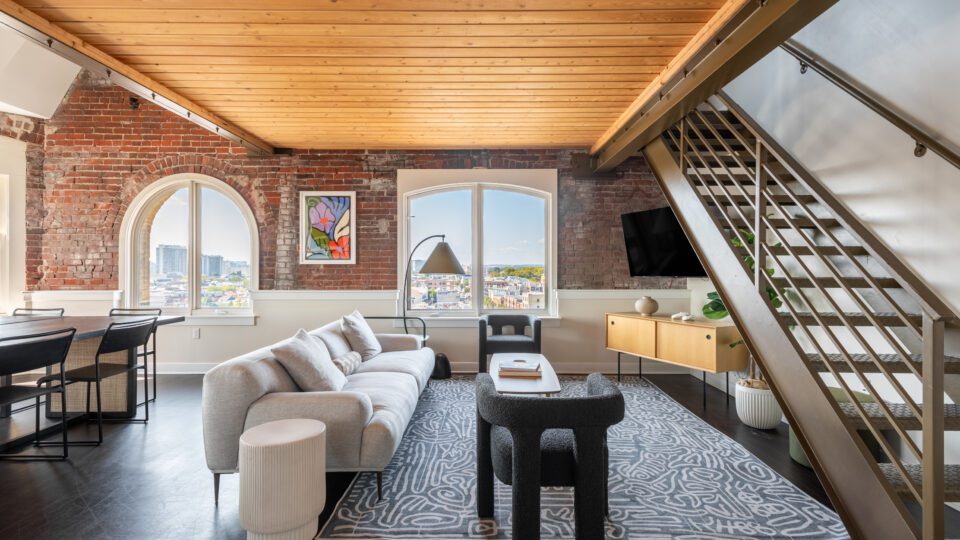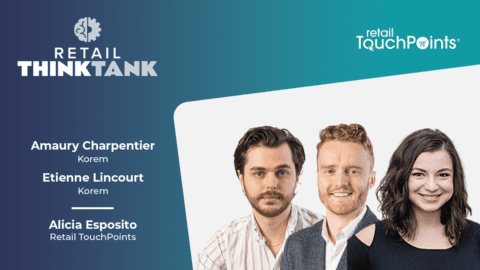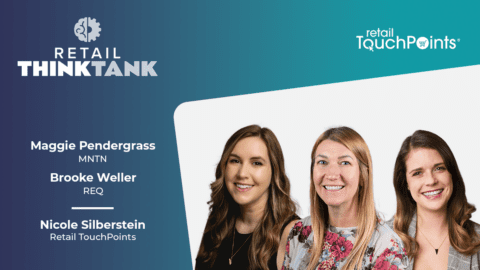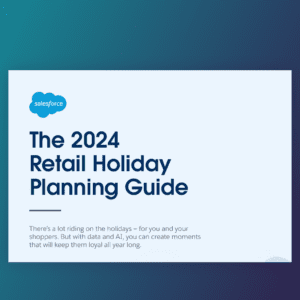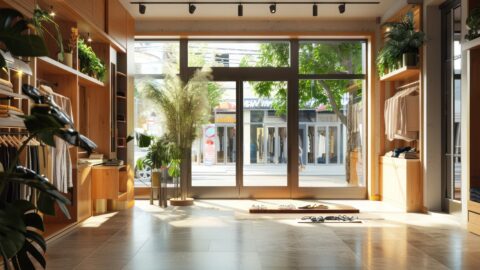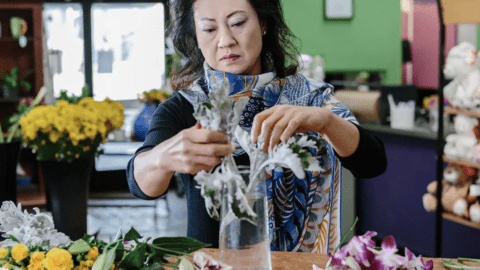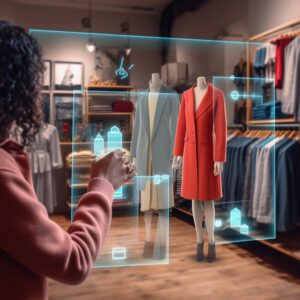It’s an experience common to almost every traveler — you stay at a hotel and fall in love with the mattress, the sheets, the lamp. If you’re lucky you’re able to track down a tag or brand name and buy the item online. If you’re not lucky, well, life goes on, albeit a little less comfortable or aesthetically pleasing than it could have been…unless you’re staying at Mint House, a new chain of boutique hotels that aims to combine the best of hotel and Airbnb experiences without all the parts consumers hate.
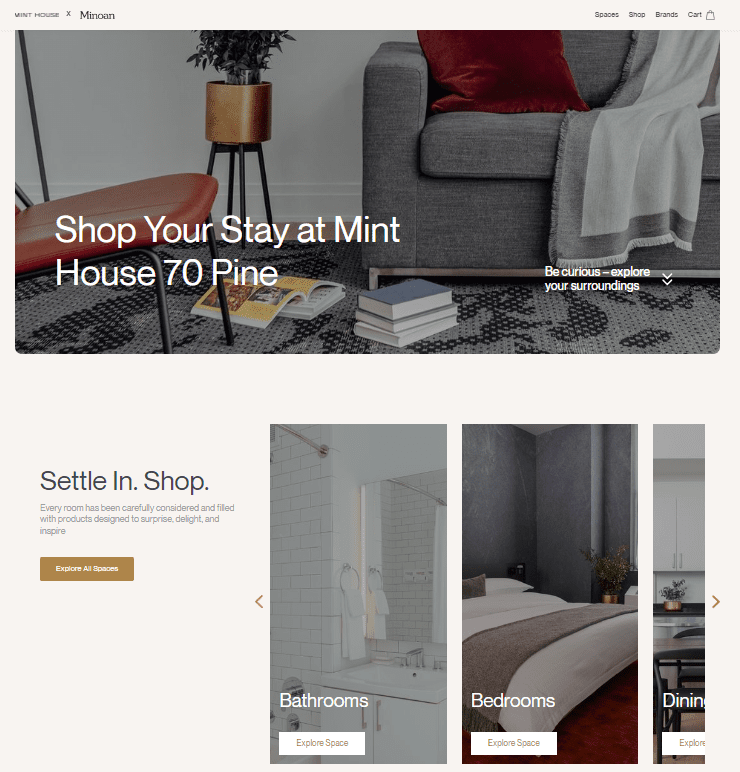
In addition to full-size kitchens with grocery service, dedicated workspaces and in-unit laundry, several Mint House locations also offer “Shop Your Stay” — a QR-code enabled experience that lets travelers purchase products they fall in love with after having the chance to test them out during their stay.
“We want to help our guests keep the routines they already have, if they want that, but we also want to offer them a new experience, whether that’s through beauty products or a new way to make their coffee in the morning,” said September Banks, Director of Interior Design at Mint House in an interview with Retail TouchPoints. “We have a lot of fun showing our guests brands that they wouldn’t necessarily experience on their own. And if they fall in love with the lotion we’re using or with the pour-over coffee system that we have, it’s really cool to see them take that part of the experience home with them.”
‘The Ultimate Try-Before-You-Buy Experience’
The experience is powered by Minoan, a B2B2C marketplace that helps hospitality operators connect their customers to brands they feature. Founded by Jet.com and Walmart veteran Marc Hostovsky in 2019, Minoan is looking to enable an entirely new kind of retail — native commerce.
Advertisement

“We believe that the best and richest product experiences don’t happen on screens the way they do at ecommerce, and they don’t happen on shelves,” explained Ally Goltz, Minoan’s Head of Growth in an interview with Retail TouchPoints. “Not to say that ecommerce or stores are going anywhere, but the best moments of inspiration happen in real life when you can touch a product, when you can use a coffee machine to actually see what the coffee tastes like, when you can sleep on a mattress, when you can use a Dyson hairdryer to see if it’s really worth the $400.”
It’s the ultimate try-before-you-buy experience. In addition to creating a new platform for brands to reach consumers and allowing hospitality operators like Mint House to forge a deeper connection with their transient customers, as Banks pointed out, it’s also a much more sustainable way to shop: “So many people are shopping primarily online, where you’re not 100% sure you’re going to love the item, and so you might return it,” she said. “We’re offering people the opportunity to get it in their hands and really see if they like it. It makes that decision to purchase just a little more considered.”
The partnership between this hospitality disruptor and an ecommerce platform looking to “shake up retail” (as Steve Crawford, Head of Product at Minoan put it), offers an intriguing new take on the idea of native commerce, a realm that so has far been relegated primarily to digital innovations like visual search and shoppable TV. But at Mint House the shopping happens in the real world — just not in a store.
How Mint House Guests Can ‘Shop Your Stay’

Mint House rooms offer travelers an apartment-style experience with the amenities of a hotel, and part of the draw is an elevated, inspirational aesthetic. At four of the chain’s 12 locations, visitors who find themselves inspired by the furniture, décor or tech and beauty products they discover during their stay can buy them right then and there by scanning one of the QR codes placed throughout the room. They are taken to that location’s Showroom page, where they can scroll through a vast range of available products.
Not everything in the Mint House rooms is available for sale, and the Showroom site for each location is different, since each property has a different design aesthetic, but many of the products customers will find in their rooms are available for purchase, including everything from kitchen spatulas to record players to mattresses.
Bringing Value to Brands, Properties and Guests
It’s all facilitated on the backend by Minoan, which has partnered with 150 brands to offer products to hospitality operators and their customers. Brand partners include large retailers like Wayfair, Williams-Sonoma’s suite of brands and Casper, all the way down to small DTC players. A property owner creates their curated Showroom page featuring the products they have at their location. All product listings in the Showroom link out to the brand partner’s website, so ordering and fulfillment of customer orders are handled directly by the brand itself.
“The whole goal is to provide value to all three parties,” said Goltz. “It’s great for brands, because they get the benefit of having these properties as marketing partners with showrooms that essentially act as free retail space. It’s an opportunity for them to tell their story to the consumer, which is especially exciting for brands that don’t have brick-and-mortar locations. It also makes things a lot easier for our property partners, because they can purchase from all of these different brands at deep discounts in one place, and manage and track those orders in one spot. And it’s a benefit for the end customer because they get to experience a really cool new retail experience, shop something that they love from their stay and take it home with them.”

As Goltz mentioned, the B2B side of the Minoan platform simplifies the procurement process for hospitality designers like Banks, who can source products for their properties from all of the brands Minoan has integrated with in one place. Minoan has negotiated discounted rates for property owners with the brands, and a universal cart experience allows designers to shop across multiple brands’ websites but then check out in one consolidated cart with Minoan. Minoan manages order tracking and communication with the property owners on behalf of the brands and also will help facilitate returns and customer service requests to streamline the experience for buyers.
“Minoan’s been such a great partner as we’ve gone through our design evolution and try new things within our properties,” said Banks. “They’ve been a major support in terms of sourcing. Whenever I’m looking for something that’s a little bit unconventional in the hotel space, it’s been a really good resource to find exactly what we need.”
Property owners also can request that Minoan onboard specific brands so their products can be made available to guests/customers. For example, Mint House has created custom mattresses in partnership with Bear that are now available to buy through Minoan.
“Relying on our property partners to make brand recommendations is one of the ways that we’ve really grown our assortment,” added Goltz. “We have the big brands and now we’re at the stage where more often than not, our partners like Mint House [introduce us to a brand] and ask us to broker a partnership with them.”
Hospitality buyers can use the Minoan platform for free; the company makes its money primarily through rebates on the B2B side of the business and also gets a cut of B2C sales made through its platform, which is split 50-50 between the property and Minoan.
Expanding and Localizing
The response from Mint House guests to the offering has been “small to start, but very enthusiastic,” said Banks, so the company plans to continue to expand the offering both in reach and breadth of product.
In particular, guests seem most drawn to “items that really provide a tactile or sensory experience,” Banks said. “People are really responding well to our mattresses, which I didn’t necessarily see coming. So it’s primarily pieces that are kind of a big purchase, or a little bit sentimental, that have been performing the best.”

Other popular products include the Stagg pour-over coffee system featured in Mint House kitchens at the 70 Pine property in NYC, as well as the Denon record player featured at that location.
As they look to the future, both Mint House and Minoan see the potential to expand and further localize their offerings. “Our properties are very locally inspired,” said Banks. “We try to work with artists in the area and typically they’re developing custom products for us that are more one-off or handmade. So that’s one thing that we’re looking to dig into with this platform as we develop our local art programs — finding ways to platform those artists and give them an opportunity to potentially sell their products with us.”
At the moment though, there are practical limits to just how local and independent new vendors can be, said Goltz: “We’re not playing in the SMB space quite yet, brands like if you’re in the Hamptons, the local pottery artist down the street,” said Goltz. “Our vendors need to be able to sustain the quantity and volume of orders that we’re pushing, but [bringing in smaller, local brands] is definitely one of our goals. When I think about myself as a consumer, sure I could go to a property and love the mattress, the pillows, the couch, but what I’m actually most excited about or most likely to take away would be the cool mug that I’m drinking my coffee out of at an Airbnb in Joshua Tree.”




